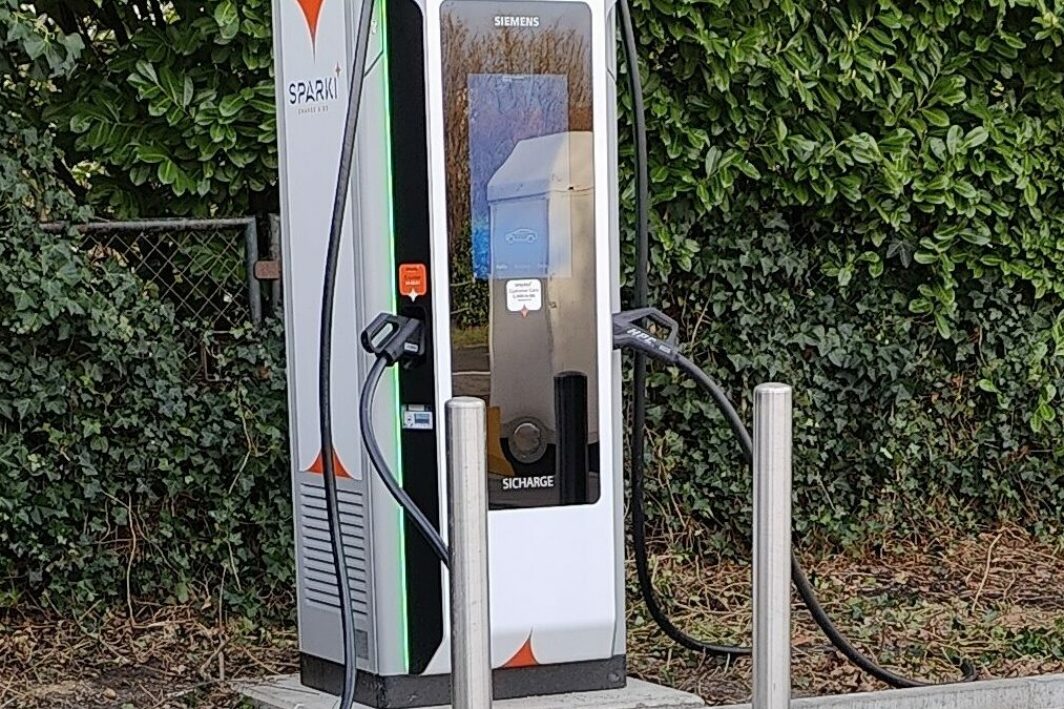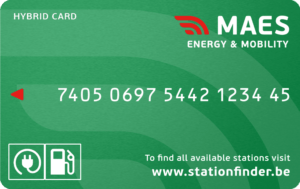
Electric charging with MAES
Here you can find all useful information about electric charging
MAES Charging stations
You have been able to go to MAES for a while now with your electric or hybrid vehicle thanks to our MAES Hybrid Card. But on top of that, we also started a project to install fast chargers at our own stations. By the end of next year, we should have installed 100 charging stations at our locations throughout Belgium.
Which connection can you find at the MAES Stations?
At MAES we are also working on building 100 Ultra-Fast-Charging piles at our locations, in collaboration with our partner Sparki. The intention is that you (depending on your car) are good for hundreds of kilometers within 10 to 20 minutes to continue your journey back.
Our charging stations have 2 plugs, a standard CCS cable that can supply a maximum of 320 kW and a liquid-cooled cable that can handle up to 1,000 kW. Sparki’s current poles give a maximum of 350 kW because there are hardly any vehicles that can handle more than 350 kW. This allows you to charge the battery of your electric car to 80% in a minimum of time. Our charging stations are at least 6 times faster than the first generation of fast chargers (50kWh), which can still be found in many places. The power and speed of our charging stations can therefore not be compared to a classic charging station, which only supplies a fraction of the speed of our charging stations
In the meantime, you can already charge ultra-fast at MAES at the following locations
The first piles were placed at our ESSO Wilrijk station at the end of 2022, meanwhile, piles have been added at ESSO Destelbergen, ESSO Beveren, MAES Sint-Kruis, SHELL Assebroek and also MAES Deinze. In the coming months we will have a total of 100 piles added at many locations.
MAES Hybrid Card
Not only can you go to MAES for the ultra-fast chargers. Whether you have a fully electric car or a hybrid car, you can use our MAES Hybrid Card for both. It combines the positive points of the regular fuel cards with an option where you can also charge electrically. Discover the map here.
All useful information about electric charging with MAES can be found here.
FAQ
How much power do I need to charge my electric car?
The power required to charge an electric car depends on the capacity of the battery and the charging speed of the charging point. In general, the larger the capacity of the battery and the faster the charging speed, the higher the power required. An average electric car has a battery capacity of about 60 kWh and can be charged from 0 to 100% in about 8 hours with a charging speed of 7.4 kW. For faster charging speeds, for example at a fast charging station, higher power is required.
Can I charge my electric car at home?
Yes, most electric cars can be charged at home using a charging station or a regular socket.
Is it safe to charge an electric car?
Yes, it is safe to charge an electric car. Electric cars are designed to be safe while charging, and most charging stations have protection mechanisms to prevent overload and short circuits.
How much does it cost to charge an electric car?
This depends on the price of the electricity and the capacity of the charging point. In general, charging an electric car is cheaper than refueling with petrol or diesel.
Can I charge my electric vehicle while driving?
At the moment it is not possible to charge an electric vehicle while driving, as wireless charging technology is still under development.
How do I pay for charging my electric vehicle?
This depends on the charging infrastructure and the payment method that has been set up. For example, you can pay with a charge card (such as the handy MAES Hybrid card), via an app or via a credit card.
Where can I charge my electric car?
You can charge your electric car at public charging points, at fast charging stations, at home or at work.
What is the range of an electric car?
The range of an electric car depends on the capacity of the battery and the consumption of the car. On average, electric cars have a range of 200 to 300 kilometers.
